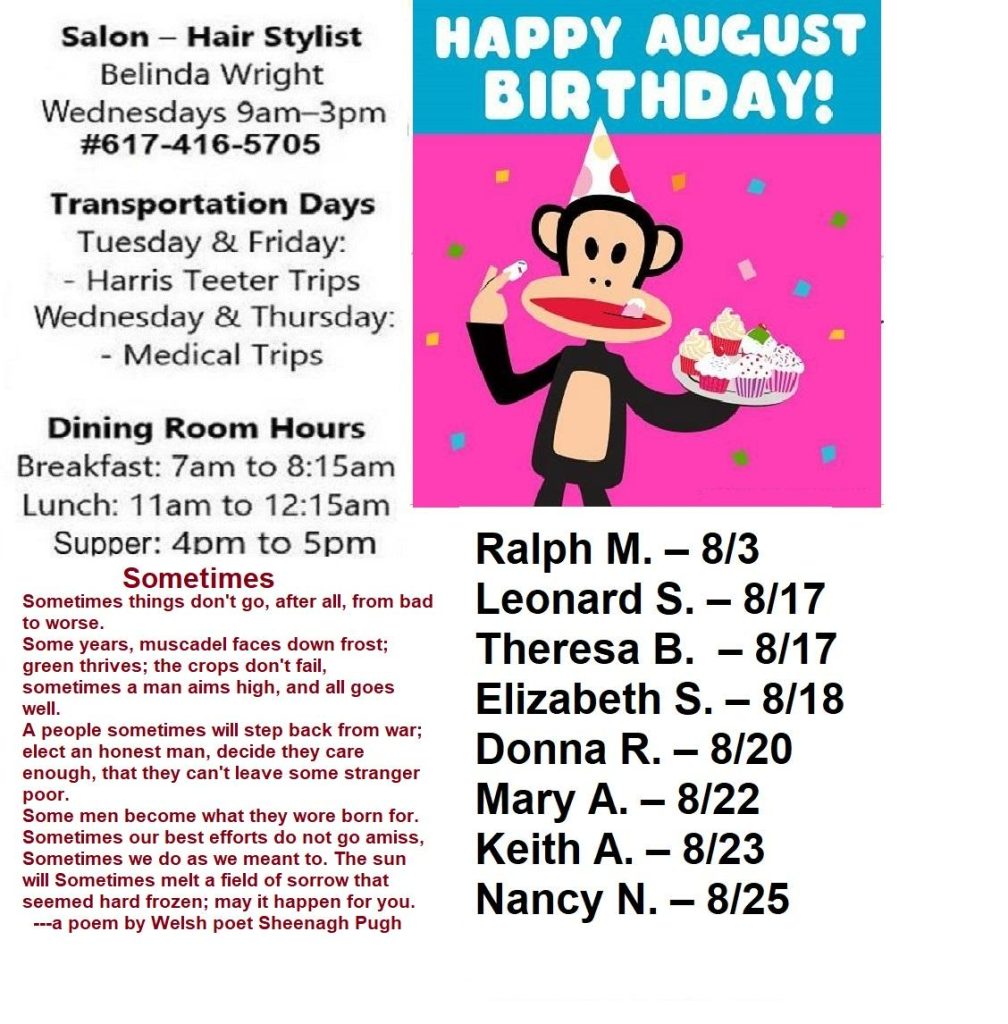THE VILLAGE TIMES
Independence Village of Olde Raleigh Resident Newsletter


Resident Jay Gordon moved into Independence Village back on June 15, 2021. He was followed nearly a year later (April 15, 2022) by his mother, Sylvia Gordon, shortly after her husband died. Jay has lived in Raleigh and has worked for a number of years for Rex Hospital transferring patients to and 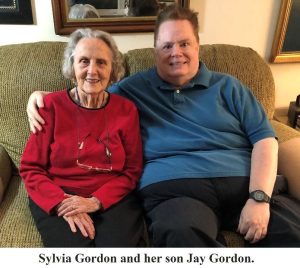 from radiology and other departments. He also likes to sing and act and has taken an acting gig in Raleigh’s
from radiology and other departments. He also likes to sing and act and has taken an acting gig in Raleigh’s  Little Theater (“I always wanted to be a movie star,” he chuckles,)
Little Theater (“I always wanted to be a movie star,” he chuckles,)
“I’m glad I moved here,” says Jay, “And so much has happened: During freak winter weather some of our pipes froze. A few drops of water began dripping onto my bed from the ceiling. Just as I left the room to report it, I heard a tremendous crash! It turned out that a pipe had sprung a leak right over my bed. The water build-up had proved too much for the ceiling and down it came. I thank the good Lord for saving me because my bed was totally destroyed – but without me in it. My mother, who lives just down the hall, was OK. And so was “Cally”, our cat.
Jay (aka John Boyd Gordon III) was born July 10th,1959. His father, John Boyd Gordon II, was born in Gastonia, N.C. and served in U.S. Army Counter-intelligence during the late 50’s (1956-1959). “He was also a prize-winning amateur photographer,” says Jay. “Going back even further, my great-grandfather was a Presbyterian minister.”
“Speaking of names,” said Sylvia, “I was born as Margaret Catherine. But it was the ”wrong” name as the result of a family misunderstanding, My grandmother solved the problem: she picked out the name Sylvia. I wasn’t aware of any of this until years later when I discovered my original name on an old application my parents had filled out for me to join the National Society Children of the American Revolution (C.A.R.).
“Anyhow,” she continued, “I met and married Jay’s father in Shelby, North Carolina, where I was born and grew up. The Army moved us from place to place, such as Baltimore and Richmond. I graduated from Queen’s College in Charlotte, N.C., after which I taught high-school English in Baltimore and Richmond (where Jay was born). Then I worked in Raleigh for the North Carolina Library for the Blind and Physically Handicapped for nearly 29 years until I retired in 1998.”
“Jay has a younger sister,” she continued. “Her name is Catherine and she works in Houston, Texas as a pediatrician and endocrinologist. She tells me she will soon be taking a job with NIH in Bethesda, Maryland.”
Sylvia, by the way, is an artist – and a very good one, I might say. She began to paint at age four and has been taking painting classes since 1976. Most of her artwork, saved when she moved out of the family home of 54 years on Raleigh’s Wayland Drive, now adorn the walls of her apartment.


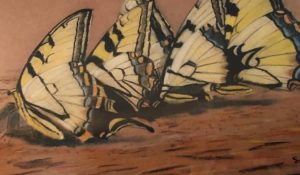
 Collards – by Margie Lewin
Collards – by Margie Lewin
Few culinary traditions run as deep as collards in North Carolina. This leafy green claims one of the longest growing seasons of any in North Carolina’s crops, and is oftentimes all that remains in home gardens and farms come January. On New Year’s Day, tables are filled with foods that symbolize luck and money: black-eyed peas, cornbread, ham and collards, the last of which resemble dollar bills and are believed to invite prosperity. Just like the New Year, collards return again and again to nourish and delight, bringing with them hope and a sense of State pride.
In downtown Ayden, N.C., there is even a Collard Festival parade that includes live music, art shows, food trucks and more. this event is 50 years old.
Lebanon – by Richard Smalto
When I was in the army, I belonged to the 48th armored infantry an outfit stationed in Europe that lost its colors in Korea because it ran. Colors are critical to the success of an army. They mark the location of the commander and serve as a rallying point for the troops. In the chaos of battle the ability to maintain a formation is critical to the army’s success. Because of the use of modern weapons and a change in tactics, colors are no longer carried into battle. However, in the past an elite corps of soldiers protected the colors and it was considered a great feat of arms to capture them.
As a result of this tradition, we watched with a great deal of curiosity and a certain degree of trepidation as each company came to full strength while the remainder of the battalion was put into a state of readiness and complete mobilization. Reorganized and ready one evening. the German girls we were drinking beer with told us not to go to bed that night. That night at two o’clock in the morning we were awakened and mustered to be deployed we knew not where. Loaded onto large troop transport trucks, we moved to an airfield staging area where we waited to be told what our mission was. We drank coffee as airplane engines came to life and non-commissioned officers scurried about. Engines roaring, hearts pounding, the order came to send us back.
Later that day, in the barracks, we learned that Eisenhower decided to give us a chance to recover our colors by sending us into Lebanon to keep the peace. Before the order could be carried out, he changed his mind and told the generals to send in the marines. He said because he thought the 48th would muck it up again.
Somethin’ Fishy: A Fish Tale – by Frank Howes
Once upon a time there was a group of men fishing for herring in a branch that ran into Contentnea Creek in eastern North Carolina. This was in the mid-sixties when the herring and shad were still thick in the rivers and streams when they ran in early April. On this particular occasion, the men were fishing at night, and while they waited for their nets to fill, they told tales around a campfire.
Among those around the campfire was a young man named Eddie and a wizened old man named Mr. Tom.
Eddie was a classic Southern good-ol’ boy and a former high school football star. He was competitive to a fault, and sometimes given to bragging.
Mr. Tom was a laconic old tobacco farmer who was fond of a good joke.
This evening, the conversation, naturally enough, turned to fish stories: who had caught the biggest fish, what was the best fish bait, and so forth. Many people told their story, but after each one, Eddie told a story about a bigger fish. People around the fire were obviously getting impatient with Eddie’s one-upmanship.
Finally, at just the right moment, Mr. Tom started talking. He told a story about a bass he pursued in 1934. “I was a’ter this bass one time in ol’ man Corbett’s pond. I seen him jump once or twice. He was huge, but I could never catch him. Hooked him a couple o’ times, but he got away every time. I was bound and determined to catch that fish, so I kept working at it.
“But that was a smart fish. He never bit on the same bait twice. I started out using worms. Then I used crickets, and later I tried grubs from a wasp nest. Each time I hooked him he got wiser. Like I said, that was a smart fish.”
Determined to outdo Mr. Tom, Eddie said “Yeah, I’ve caught some big bass, but I like artificial lures, especially rubber worms. One time I caught an 11-pound bass on a rubber worm. Man, did he put up a fight.” He paused a moment, then said, “Mr. Tom, did you ever catch that fish.”
“Yeah, I finally caught him. I outsmarted him.”
“What’d you catch him on Mr. Tom?”
Straight faced, without the slightest gleam in his eye, Mr. Tom said, “Castor oil.”
“Castor oil‽ How’d you catch a fish with castor oil‽”
“Well, I found out where that fish was a-layin’ up. I started feedin’ him regular one day. I fed him all the baits I’d used – worms, crickets, grubs, all his favorite foods. And then I used the castor oil, and I caught him!”
“I still don’t get it, Mr. Tom. How’d you catch him with castor oil?”
“Well, I soaked some bait in castor oil, and I fed it to him. I fed him ‘til he couldn’t eat no more, and that’s how I caught him.”
“What,” said Eddie, “I still don’t understand how that helped you catch that fish.”
“Well, that fish was so full, he was about to bust open, and when he crawled up on the bank to take a crap, I just reached down and picked him up.
“Man,” Mr. Tom continued, “that was a whopper! It might have been a mite smaller than your eleven-pound whopper, but that was a big ‘un!”
It’s Never too late…

Olive – The Cat with Seven Lives – by Pat Simpson
Recently my daughter Diana took her two boys, Charlie & Johnnie on a trip to Maine, specifically to Long Cove Artist Cottage, a rustic little self-contained Maine cottage on Deer Isle, located about 20 miles out in Penobscot Bays – a perfect retreat: everything they would need in one location – walking, swimming, and boating.
The boys love animals, and when they met Olive the cat, it was love at first sight. Olive was very friendly, but her patchy fur seemed to indicate she was still on the mend from an injury. Her owner & host, Judith, said she was taken by a Bald Eagle but somehow got away and survived the attack,  crawled home, and managed to get patched back together.
crawled home, and managed to get patched back together.
“Olive was alone and covered in tree sap and very sick when I found her,” Judith explained. “After a lot of baths and medication, she was finally well enough to move back in.”
“Wow,” said Johnnie, “I’m glad she’s alright.”
“So am I,” said Charlie. “I’ll bet she has nightmares1”
Olive, now on the bed where they had placed her, looked up as if she wanted to talk. As you know, cats can’t talk. But I’ll bet you didn’t know they could think…

“You don’t know the half of it,” thought Olive. “Not only can I think, but I do have nightmares…let me tell you why…I was minding my own business – as cats always do – when ‘Bam!’ something hit me on my back. It really hurt! And I immediately felt myself being lifted from the ground. Something was pinching my back and I was getting higher and higher…so high that I thought I was looking down from Heaven.
“That’s when I lost the first of my nine lives.
“Suddenly, whatever or whoever it was, let me go. That’s when I fell from the sky. And that’s when I lost my second life.
“It wasn’t until much later (as my mom Judith explained to me) that I learned eagles drop their prey to incapacitate them. They will use their strong talons to grab them and throw them off a high cliff. After they drop dead from free-fall, the eagle will devour them.
“All I can say is that the next thing I knew, I awoke in the forest the following morning. I was surrounded by dampness, mud, and an overwhelming sense of isolation. My body bore the marks of the harrowing experience, with bruises on my neck, shoulder, and ankle. My right eye was swollen shut and I felt a wave of dizziness wash over me. I came to the grim realization that I had survived a great fall through the forest. Overhead, I could hear the cry of an eagle but the dense canopy of trees obscured me from its view.
“What now?” I thought. “But I realized I had no choice. I had to confront the daunting challenge of surviving alone in the treacherous cold forests of Maine – and I would have to use every survival skill as well.
“Aware that I couldn’t stay there forever, I decided to venture into the forest. I carefully treaded forward, one step at a time, as a precautionary measure to avoid stepping on hidden snakes or insects. I repeated this process – stepping and listening – repeating the cycle as I forged my way through the treacherous terrain.
“I had no food, and when thirst struck, I resorted to licking water droplets from tree leaves. Determined to find civilization and home, I followed a small creek, hoping it would lead me to a larger river and eventually to help. Days without sustenance took their toll. I succumbed to hallucinations. With sheer determination I somehow managed to persevere. However, I heard a voice that seemed too real to be a mere figment of my imagination. It was Judith! She emerged from the forest, took me home and provided me with food and tended to my injuries.
a larger river and eventually to help. Days without sustenance took their toll. I succumbed to hallucinations. With sheer determination I somehow managed to persevere. However, I heard a voice that seemed too real to be a mere figment of my imagination. It was Judith! She emerged from the forest, took me home and provided me with food and tended to my injuries.
“It was Judith who gave me healing. It was Judith who gave me the care I desperately needed.
“Judith, I am but a cat; but I still have seven lives and I’ll be your friend forever!”
P.S. It wasn’t until later that I learned that Judith could have protected me with a “raptor shield”. You know – Protects against raptors. birds of prey: hawks, owls, eagles – like the one that almost got me. You can also get something like a spike vest or a coyote vest. What eagle in its right mind would want to attack cute little me? It would get a mouthful of spikes!”
Our First Wedding Anniversary: A Note of Thanks from Pat and June Cheek Simpson
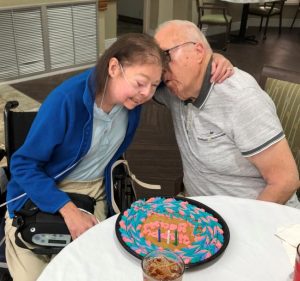
June and I just want everyone to know how grateful and thankful we were for Food and Dietary Director Charlie Banks (C.B.) and his staff’s fabulous treatment of us on Sunday evening, May 21, 2023. Just a couple of days before that I had mentioned in passing to C.B. that Sunday marked our first wedding anniversary. As you may know, June Cheek and I were married right here in the dining room a year ago. We will never forget C.B.’s wonderful food and service at our wedding reception that day.
Fast forward one year later to Sunday evening – food server Mary Saseen had asked us at lunch-time to be at a certain dining room table at 3:30 pm. We knew that something was up – so we indeed arrived on time. Lo and behold, Mary, assisted by Imani Kelly and Jamaul Bible, brought forward a wonderful round wedding anniversary cake with three candles. She got the crowd to say “Happy Anniversary” as June blew out the candles. It was a wonderful cake (and wonderful prime rib) and we had a wonderful time!
I pray for C.B. and his staff every day, asking God to grant them the gifts of “helps”, the gift of patience, and the gift of love. God granted all three prayers last Sunday night. June and I would like to thank them from the bottom of our hearts. May they all have one blessed day after another!
Resident Ramblings
Disclaimer: The information contained in this newsletter represents the views and opinions of the original creators of such information and does not necessarily represent the views or opinions of Independence Village nor does it constitute an endorsement by Independence Village or its affiliates of such information.
Kindred Spirits – by Margie Lewin
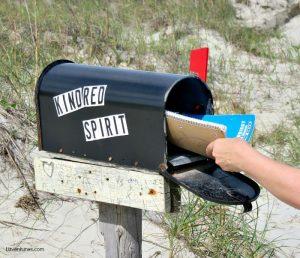 Down-channel from Southport. the landing where the old swing bridge used to carry traffic across the International Causeway and the back marsh to Sunset Beach, is now a boat launch with a new mammoth, soaring high-rise bridge arching over it.
Down-channel from Southport. the landing where the old swing bridge used to carry traffic across the International Causeway and the back marsh to Sunset Beach, is now a boat launch with a new mammoth, soaring high-rise bridge arching over it.
But something has been lost along with the old bridge – a relic that connected but also insulated and isolated you to take your chances in a lonely place. Still some traditions hold steady. Tucked between windswept dunes in Bird Island just beyond Sunset Beach, almost to the border of South Carolina, stands a mailbox with a simple address: “Kindred Spirits”. It serves as a kind of outdoor confessional, into which beach-walking strangers deposit letters baring their deepest longings, their hardest grief, their piercing regrets, their cherished memories, and their soaring hopes – all for other strangers to read. This mailbox was featured in one of the novels by Nicholas Sparks.
The Lisbon Earthquake-by Richard Smalto
 The 1755 earthquake of Lisbon had such a profound effect on the world that we are still feeling its impact today. It demolished one of the most important cities of the 18th century and it unsettled the thinking of the time.
The 1755 earthquake of Lisbon had such a profound effect on the world that we are still feeling its impact today. It demolished one of the most important cities of the 18th century and it unsettled the thinking of the time.
Many believed the earthquake was a punishment from God. Others wondered if science was a better way to the understand the universe and how it works. We now associate these thinkers with the Age of Enlightenment, a period of history that led to the French Revolution and the American War of Independence.
By the middle of the 18th century, Portugal’s capital of Lisbon was the fifth-most populous city in Europe, its port the third-busiest. It was one of the wealthiest cities in the world. Just before 10 a.m. on November 1, 1755—All Saints’ Day—a fault line 200 miles off the Iberian Coast ruptured, releasing the energy equivalent of 32,000 Hiroshima atomic bombs. So powerful was the earthquake that its effects were felt from the Azores to Sweden. Lisbon suffered the worst of it. Over the course of the next few minutes—and the arrival of two additional tremors— [the earthquake] bought down a great European city. It could have measured up to a 9.2 on the Richter scale.
I had a chance to visit this exquisite city in 1960 before the communist government took over the country. I was stunned by the remarkable allure of this city located on the Iberian Peninsula of the European continent. Intrigued by the beauty and the charm of this remote city, I inquired about the reason for such characteristics. I knew about the past grandeur of this country and the achievements of Henry the Navigator and other famous seafarers but was still surprised by what I had encountered. I was informed that the city was rebuilt after an earthquake. That’s when I learned about the Great Lisbon earthquake and the destructiveness of it for the first time. I was told the city had to be rebuilt because the tsunami that followed the earthquake which had crumbled buildings and started raging fires, lifted the Tagus River out of its river bed and crushed the city within a wall of water as it retreated.
I later learned about the profound effect the earthquake had on the Enlightenment thinkers such as Voltaire, Rousseau, Kant and others and how the earthquake was the catalyst that cultivated science and began to alter the way people thought about religion and God. Scientists around the world put forth explanations for the earthquake and in the process, established fields of seismology and scientific geology. However, it both strengthened and weakened Enlightenment thinking.
Because scientists were unable to give a compelling reason for all that had transpired, the clergy could state the Enlightenment was flawed and suggested it could have been the act of a vengeful God.
My Sister Sherry – by Phyllis Woolley
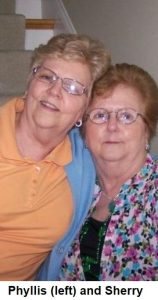 My sister Sherry Lee was born fourteen months after me. My first real memory of Sherry was when we moved to Eureka Avenue in Shively, KY. Sherry was probably three years old. She hated riding in a car. We were all piling in the car to go to visit our Uncle Robert. He had taken my older sister, Jeneanne, who was in school, to live with him. His housekeeper had agreed to help care for her. Daddy was out of a job and was doing any little part time job he could to feed his family. Mom was pregnant and couldn’t get a job. There was no unemployment, nor was there a food stamp program. We thought Jeneanne was lucky to live with Uncle Robert. He lived in a big house in the city. He was Pastor of St. John’s Catholic Church and School. Jeneanne had pretty clothes and lots of toys. On the other hand, she thought she had been given away. We loved to visit because Uncle Robert always made sure that Jeneanne had little gifts for all of us. Anyway, there was no way Sherry was getting in the car that day. I can still see her running around the yard, screaming to the top of her lungs, with Sonny and Butch, my older brothers trying to catch her. Sherry Lee was named after a race horse, and that little girl could run like a race horse. After a few minutes of the boys chasing her, she would finally drop to the ground and kick and scream. So no children would be visiting Jeneanne that day. We were all mad at Sherry, but she didn’t care. She just wasn’t getting in that car. That would not be the first time that she would outrun us all.
My sister Sherry Lee was born fourteen months after me. My first real memory of Sherry was when we moved to Eureka Avenue in Shively, KY. Sherry was probably three years old. She hated riding in a car. We were all piling in the car to go to visit our Uncle Robert. He had taken my older sister, Jeneanne, who was in school, to live with him. His housekeeper had agreed to help care for her. Daddy was out of a job and was doing any little part time job he could to feed his family. Mom was pregnant and couldn’t get a job. There was no unemployment, nor was there a food stamp program. We thought Jeneanne was lucky to live with Uncle Robert. He lived in a big house in the city. He was Pastor of St. John’s Catholic Church and School. Jeneanne had pretty clothes and lots of toys. On the other hand, she thought she had been given away. We loved to visit because Uncle Robert always made sure that Jeneanne had little gifts for all of us. Anyway, there was no way Sherry was getting in the car that day. I can still see her running around the yard, screaming to the top of her lungs, with Sonny and Butch, my older brothers trying to catch her. Sherry Lee was named after a race horse, and that little girl could run like a race horse. After a few minutes of the boys chasing her, she would finally drop to the ground and kick and scream. So no children would be visiting Jeneanne that day. We were all mad at Sherry, but she didn’t care. She just wasn’t getting in that car. That would not be the first time that she would outrun us all.
Sherry not only disliked riding in a car, she didn’t like company. When company came, she would hide until they left. Sherry was small for her age and was very pretty with blond hair and blue eyes. She also had a bit of a lisp. Which made her even more adorable.
In February, 1947, our sister Mary Pat was born. Uncle Robert had gotten a small wooden cradle made by a prisoner at Eddyville Penitentiary. (Rev Robert Willett was Prison Chaplain at the time. Our Uncle Robert was a Catholic Priest. To us, he was just plain Uncle Robert.)
Sherry and I were responsible for entertaining Mary Pat. We would rock that cradle so hard that the sides would nearly touch the floor. The best I remember, she never rolled out. Sherry adored her baby sister, as did I. To Sherry, Mary Pat was like a baby doll. She and Sherry developed a bond that would last through adulthood
The house on Eureka Avenue was rundown, but mama kept it clean. It sat back off the road. Daddy got a job as a cab driver and worked at night. Sherry and I would lay in bed and whisper and giggle until Daddy came home. Once he was there, we would go to sleep.
When Mary Pat was nearly two years old, we moved to Route Road to the house Uncle Robert bought along with sixty-plus acres of land. The move was traumatic for Sherry Lee. She didn’t like change and she would hide more often. She would more often than not take Mary Pat to her hiding place. Since the move allowed Jeneanne to come back home with us, there would be lots of adjustments. Sherry, Mary Pat and I hardly knew Jeneanne, nor did she really know us.
Sherry was quite shy, and I think Mary Pat became the lead of the two and Sherry was happy to follow. Jeneanne had taken the role of big sister and I felt like the odd man out. But God had a plan for all of us.
As time went on, my two younger sisters became even closer. If you saw one you saw the other. Both married and bought homes within fifty yards of one another. Both had two children. The two families became one. Sherry had a boy and a girl and Mary Pat had two girls. The children were like siblings. As family members, the rest of is never mentioned one without the other. It was always Mary Pat and Sherry, Sherry and Mary Pat. Or Pete (Mary Pat’s nickname) and Sherry, or Sherry and Pete.
Years went by and all of us siblings got together for holidays, picnics, funerals and other special occasions. Like most big families, there were spats, and judgements of one another, but when something truly disruptive happened we were always there for one another.
Sherry was always a nurturer. She loved babies and children and dogs. One of Mary Pat’s girls, Patty, was born with multiple disabilities as a result of her father’s contact with Agent Orange during his tour of duty in Viet Nam. Mary Pat would tell you today how helpful and loving Sherry was in the care of Patty and her love was immensely returned.
Due to the unfortunate but seemingly purposeful rumors that each of us took as a personal attack, there were resentments and misunderstandings which occurred. All five sisters were barely speaking to one another as a family. Somehow Mary Pat and Sherry stuck together. One day I had had enough. I was lonely and missed my sisters. I sat down and wrote each of them a letter and told them how much I loved and missed them. I sincerely apologized for anything I could have done to hurt them. I told them the truth, that I didn’t know specifically what I had done, but I was sorry, and I was. Mary Pat was the first to call me, then Sherry. Then I got calls from the others. We all apologized to one another. We were able to mend bridges that were believed to be destroyed forever. Sorry is a beautiful word when used infrequently and comes from one’s very soul. And that was how each of us meant it
About six years ago Sherry began to show signs of dementia. She was in her mid-seventies. She began getting confused and forgetful. I know there were signs and signals that everyone missed. Hindsight is always twenty-twenty.
Eventually Sherry was diagnosed with a rare disease called Corticobasal degeneration (CBD). It deals with memory loss, loss of use of limbs and speech. There is no cure at this time and it is considered a fatal disease. Due to the fact that less than 1% of every 100,000 people get the disease, Congress does not allot the funds for the necessary research to find a cure.
Sherry made the decision to fight the disease with every part of her being. And fight she did. She faced her personal reality head on without self-pity and complaint.
On the night of June 3, 2023 Sherry lost her battle. Up to the end, she maintained her sense of humor and concern for others around her. At her side were her overwhelmed and loving family.
As I explained, Sherry was a shy and private person. She had expressed her personal desire not to have an open casket and to be buried quietly and quickly. She would be buried in a nightgown. She did not want anyone to see her not looking her very best.
Her loving children and husband honored her request. I love you Sherry and always will.
If you are reading this and have a sibling or family member you love dearly and haven’t spoken with for a while, swallow your false pride and do what we did. Make the phone call, write the letter. Family is one of the most important gifts you will receive on this earth. I thank God every day for mine.
Holy Words and the Game of Bridge – by Frank Howes
For me, life and the game of bridge have much in common. Let me explain:
I was raised in a conservative Southern Baptist church, and I was taught that the Bible was the WORD OF GOD. I believed this so strongly that when I was a freshman in college, I almost became a Jehovah’s Witness. Almost.
Then I turned in the opposite direction. I became a nonbeliever. I began questioning the Bible in general, and eventually I came to believe that the Bible was not THE WORD OF GOD. Then I began to reject all so-called Words of God, including the Bible, the Koran, the Book of Mormon, the Behaved Ghita, and the Tao Te Ching.
Today, I believe all such books are an attempt to reach out to God, and toward order and justice in the universe; but God, order, and justice are often beyond our ken. Still, I keep striving to learn the rules to life, and I often seek wisdom from the books above – especially the Bible.
Six years ago, I learned a new set of rules. I did this when I learned the game of bridge. I am still learning these rules. “What does bridge have to do with WORDS OF GOD,” you may ask. This is my answer: I think bridge is a metaphor for learning to live the life of a good man.
When I began learning to play bridge, I studied hard, I was looking for rules that would make me a good player; but to a significant degree, I was looking in vain. There is a frustrating, yet delightful thing about bridge (and life). In bridge, as in life, there are guidelines that will be true much of the time, but there are few rules that will be true all the time. No matter what rule you come up with, you can usually find an exception. I will not bore you with the rules of bridge, but I will list the following aphorisms or “rules” for life, and note that, as in bridge, there are exceptions to each of them:
- All good things come to those who wait, but time and tide wait for no man.
- The pen is mightier than the sword, but actions speak louder than words.
- Wise men think alike, but fools seldom differ.
- The best things in life are free, but there’s no such thing as a free lunch.
- Slow and steady wins the race, but time waits for no man.
- Look before you leap, but strike while the iron is hot.
- Do it well or not at all, but half a loaf is better than none.
- Birds of a feather flock together, but opposites attract.
- Don’t cross your bridges before you come to them, but forewarned is forearmed.
- Faith will move mountains, but doubt is the beginning of wisdom.

I have rejected Holy Words, but do I have faith? Perhaps not enough, for I have never moved a mountain, either literally or metaphorically. I lament this about my life; however, I should note that I have moved a hill or two, so I have not been entirely faithless or unsuccessful.
Do I have doubt? Yes, but does that make me wise? I doubt it, but therefore it is possible that I am, at least a little.
Enough said. Deal the cards.
Return to the Sunflower Field – by Pat Simpson
It was hot, even though it was still early morning in the Sunflower Field. The sun was still shining; the grass was still green; the air still smelled like springtime. So June and I went for a walk. On what was becoming an annual event we had taken it upon ourselves to visit the sunflowers again.
 Or at least one sunflower…
Or at least one sunflower…
“Where have all the sunflowers gone?” she asked.
“Turn your head,” said a voice. “They’re facing the sun.”
On this one lonely sunflower there was a bumblebee. Was the voice from the bumblebee? How could it be?
“Bees can’t talk,” I said. “They can only buzz.”
“Except for me,” said the voice. “Let me introduce myself: My name is Princess Bee. Let me repeat: You’ll have to turn your heads. The sunflowers are facing the sun. That’s what sunflowers do!”
 There was no one else around but there was a picture in my brain of a bee wearing a tiara. I shook my head; was I hearing voices?
There was no one else around but there was a picture in my brain of a bee wearing a tiara. I shook my head; was I hearing voices?
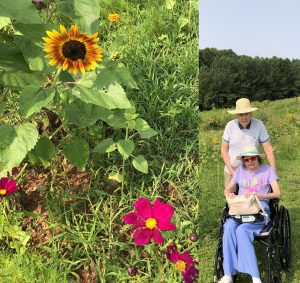 Then, as if on cue, June said, “let’s turn around so the sun is at our backs. Maybe we’ll see more flowers.”
Then, as if on cue, June said, “let’s turn around so the sun is at our backs. Maybe we’ll see more flowers.”
So, with no further ado, we got turned around and there, before us, were literally thousands of sunflowers, their bright and shiny faces emitting a sort of magnetism – a flower “charisma” if you will – out-shining their often-colorful competitors.
And then: “Oh, no!” gasped June. And there, in the sky, was a red-tailed hawk.
 “I’ve come for the bee,” it cried.
“I’ve come for the bee,” it cried.
Hawks generally prefer larger prey that’s easier to catch, so they don’t often eat bees. But this hawk decided to go for it – it dove straight for Princess Bee at speeds approaching 100mph.
Then it stopped in mid-air. It was swatting at something.
A swarm of bees.
When we last saw this red-tailed hawk it was flying into the forest, screeching in defiance and anger, but most of all – pain.
“Those are my bees,” said Princess Bee. “They won’t let that old hawk hurt me.”
June and I continued our tour of the beautiful sunflowers. It was good to have Princess Bee on our side!
